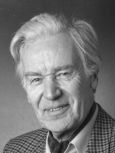
Paul Lorenzen was born on 24 March 1915 in Kiel. From 1933 to 1938, he studied mathematics, physics, chemistry and philosophy in Kiel, Berlin and Göttingen He received his habilitation (post-doctoral qualification) in mathematics in 1946 in Bonn, where he accepted a position as a paid lecturer in mathematics and the history of mathematics in 1948. In 1952, he was appointed professor (apl. Prof.) there. Starting in 1956, Lorenzen held the chair of philosophy at the University of Kiel. He went to Erlangen in 1962, where he taught until his retirement in 1980. From 1967, Lorenzen used the lecture-free period for visiting professorships at the University of Texas at Austin and, later on, at Boston University. He died in Göttingen on 1 October 1994.
Paul Lorenzen’s ideas for a constructivist foundation of mathematics had earned him international acclaim when, in the 1950s, he turned to general issues in linguistics and the philosophy of science. From then on, he championed logic, precise abstract reasoning and a methodologically well-ordered approach to philosophical discourse, a cause shared by the Erlangen philosopher Wilhelm Kamlah. At Kamlah’s instigation, Lorenzen was appointed to the chair of philosophy at the University of Erlangen in 1962. Together, the two philosophers developed what became known as the Erlangen or methodological school of constructivism.
The collection is composed of 22 folders containing an average of approx. 100 sheets as well as 4 folders containing objects. It includes articles in typescript, newspaper clippings and documents relating to the Erlangen School, a collection of letters from well-known mathematicians, logicians and philosophers, biographical materials, a game of logic (cards) as well as models of folding symmetrical surfaces made to his specifications. The bequest also contains a collection of Lorenzen’s works (including print doublets) as well as presentation copies from other authors. The material has been catalogued in full (Search the collections).
